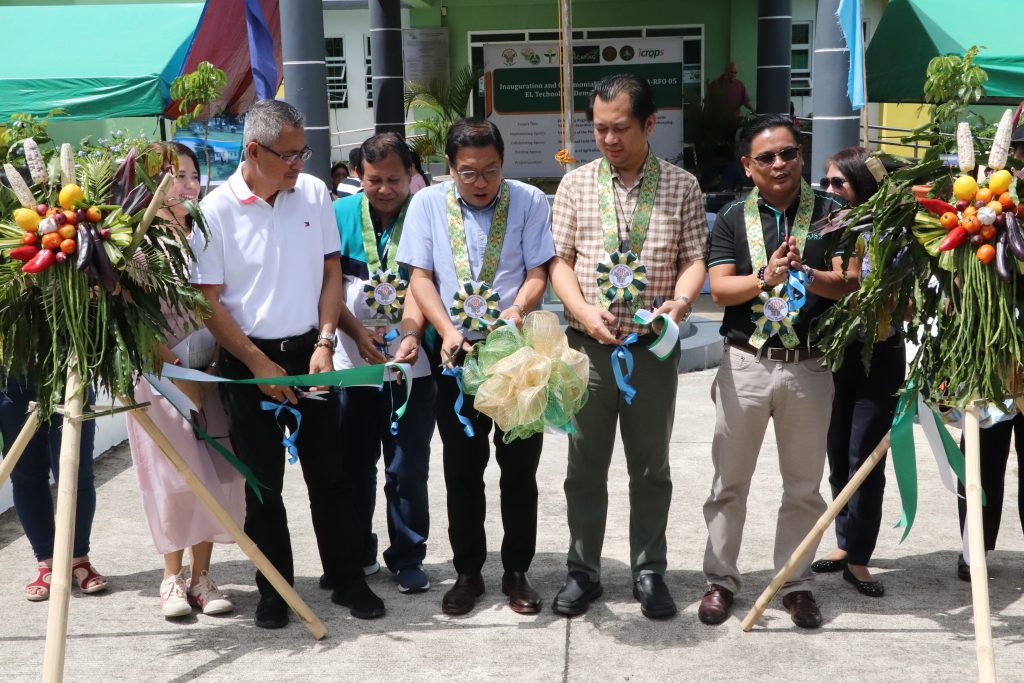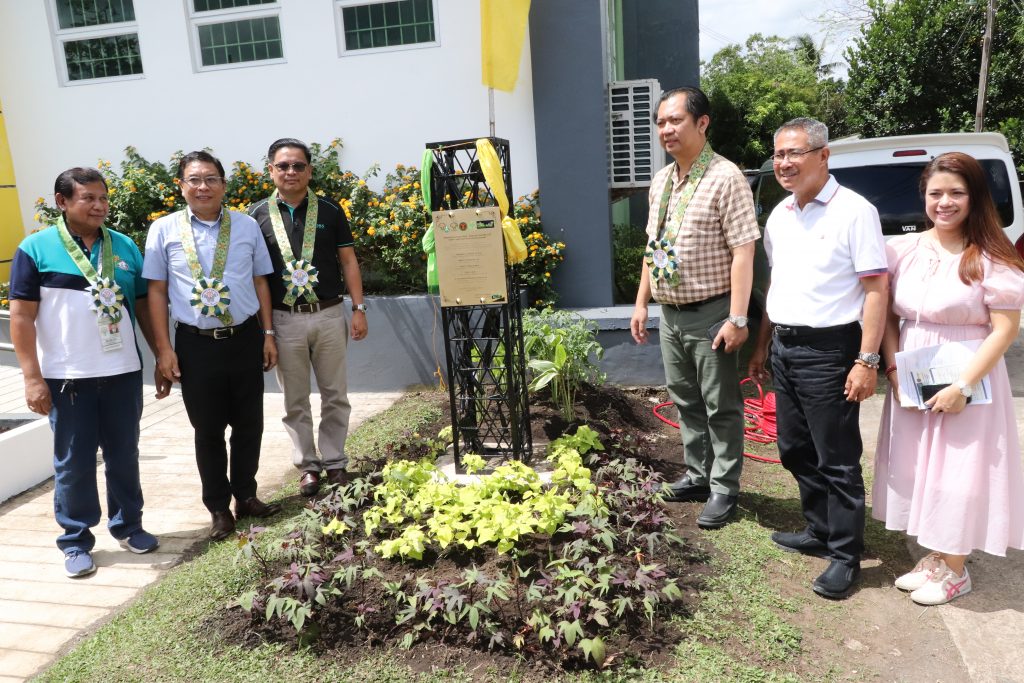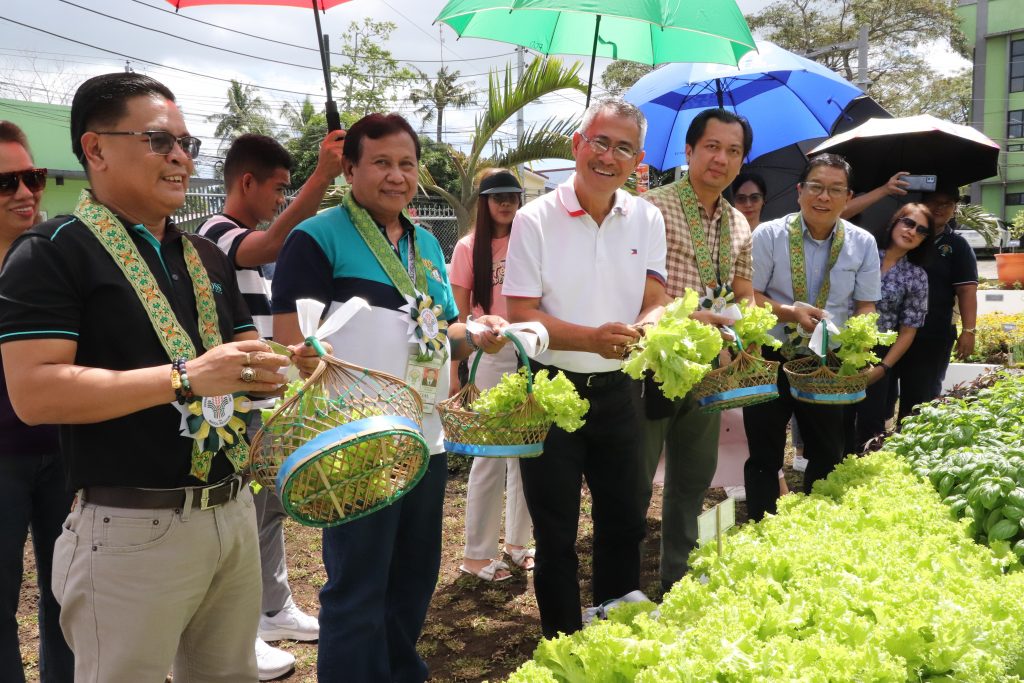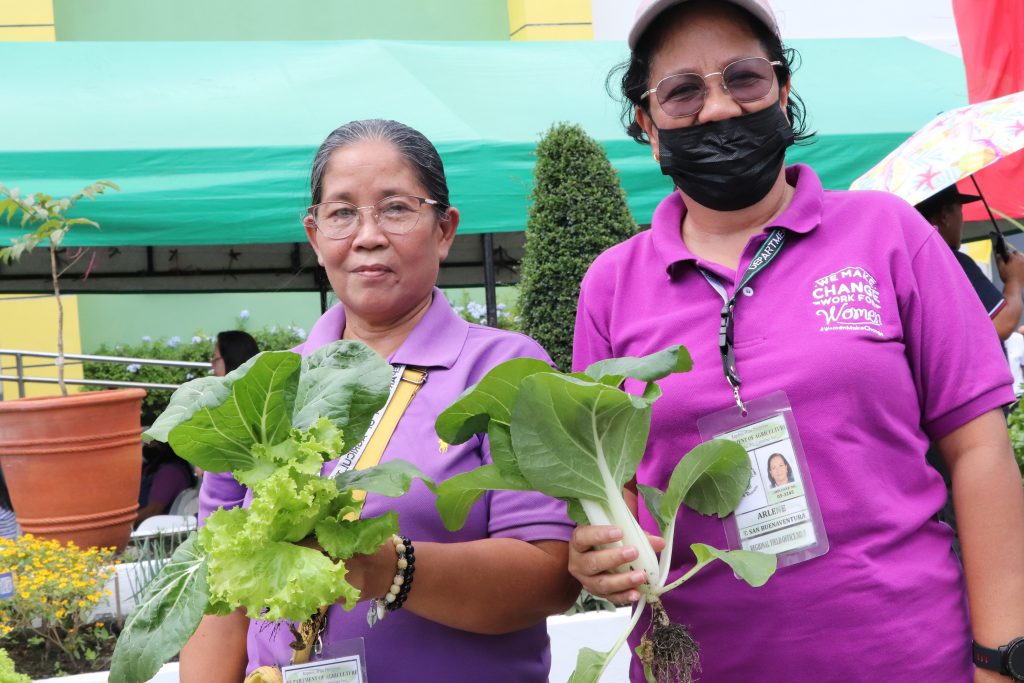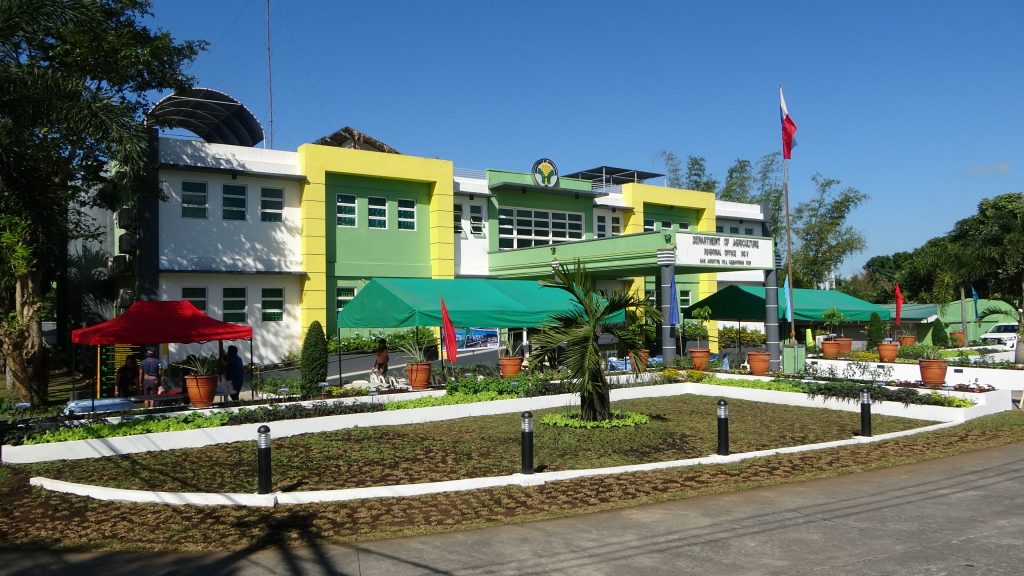SAN AGUSTIN, PILI, CAMARINES SUR – The edible landscape at the entrance of the DA Bicol compound was officially inaugurated recently. No less than University of the Philippines Los Banos (UPLB) Landscaping Project Leader Fernando C. Sanchez and Bureau of Agricultural Research (BAR) Director Joel H. Lales were in attendance during the turnover ceremony of the Edible Landscaping (EL) project.
Funded by the BAR, the project also involved the provision of seminars on EL to seven (7) LGUs and four (4) associations and LSAs since November last year.
Dr. Fernando C. Sanchez, Jr. of UPLB Foundation Inc. said that edible landscaping is the combination of the science of crop production and the art, elements and principles of landscape and garden design. “The DA RFO 5 edible landscape demo garden will serve as a learning site and model for provincial and municipal agricultural offices, barangays and other stakeholders to achieve food security. This is in line with the HAPAG kay PBBM or Halina’t Magtanim ng Prutas at Gulay, Kadiwa’y Yaman, Plants for Bountiful Barangays Movement to fully realize our goal that no Filipino should be hungry.
Meanwhile, Dr. Joel H. Lales, Director of BAR said that El is a very timely pursuit as President Marcos aims for a massive campaign of putting up community-based gardens in around 42,000 barangays in the country to help communities produce their own food.
The UPLB El technology uses hardscapes such as cemented structures and soft scapes wherein 70% of the plants are edible such as vegetables and herbs, while 30% are ornamental plants that give contrasting colors to the landscape.
Highlighted at the edible landscaping demo garden at DA Bicol are the champion commodities of Bicol Region – pili, taro, chili pepper and Formosa Queen pineapple planted in giant pots.
DA Bicol Regional Executive Director Rodel P. Tornilla thanked the UPLB FI for choosing Bicol as one of the pilot regions for EL, and the DA-BAR for funding the said project. “The project Enhancing Regional Capacities on Urban Agriculture towards Nutrition-sensitive Crop Production through Edible Landscaping ay mistulang hitting 3 birds with one stone dahil sa mga nasasagot nitong suliranin,” he said.
Tornilla added that Urban agriculture is also an answer to the problem of decreasing productive agricultural lands. Under the National Urban and Peri-Urban Agriculture Program, the DA is promoting community gardening, vertical farming, hydroponics, container gardening, rooftop gardens and edible landscaping. “For us Filipinos, visual evidence is very important as we adhere to the philosophy ‘To see is to believe.’ The aesthetic appeal of edible landscaping will serve as an effective show window for others to emulate or adopt. Aside from the Local Government Units, the schools currently implementing the Gulayan sa Paaralan are the best adoptors and beneficiaries of this project in the long run, to teach our school children the value of planting our own food, and at the same time provide nutritious food for them,” he added.
DA Bicol pushes for edible landscaping as an answer to increasing prices of agri commodities. Also included in DA’s campaign towards food security are community gardening, vertical farming, hydroponics, container gardening and rooftop gardens.
Aside from trainings given by the UPLB at the Sonrisa Farm in Magarao, Cam. Sur last year which was attended by agricultural extension workers of selected municipalities, re-echo seminars will also be conducted to facilitate the transfer of knowledge and technology to other institutions like schools and other government offices. (Lovella P. Guarin)
DA Bicol showcases UPLB edible landscaping technology
SAN AGUSTIN, PILI, CAMARINES SUR – The edible landscape at the entrance of the DA Bicol compound was officially inaugurated recently. No less than University of the Philippines Los Banos (UPLB) Landscaping Project Leader Fernando C. Sanchez and Bureau of Agricultural Research (BAR) Director Joel H. Lales were in attendance during the turnover ceremony of the Edible Landscaping (EL) project.
Funded by the BAR, the project also involved the provision of seminars on EL to seven (7) LGUs and four (4) associations and LSAs since November last year.
Dr. Fernando C. Sanchez, Jr. of UPLB Foundation Inc. said that edible landscaping is the combination of the science of crop production and the art, elements and principles of landscape and garden design. “The DA RFO 5 edible landscape demo garden will serve as a learning site and model for provincial and municipal agricultural offices, barangays and other stakeholders to achieve food security. This is in line with the HAPAG kay PBBM or Halina’t Magtanim ng Prutas at Gulay, Kadiwa’y Yaman, Plants for Bountiful Barangays Movement to fully realize our goal that no Filipino should be hungry.
Meanwhile, Dr. Joel H. Lales, Director of BAR said that El is a very timely pursuit as President Marcos aims for a massive campaign of putting up community-based gardens in around 42,000 barangays in the country to help communities produce their own food.
The UPLB El technology uses hardscapes such as cemented structures and soft scapes wherein 70% of the plants are edible such as vegetables and herbs, while 30% are ornamental plants that give contrasting colors to the landscape.
Highlighted at the edible landscaping demo garden at DA Bicol are the champion commodities of Bicol Region – pili, taro, chili pepper and Formosa Queen pineapple planted in giant pots.
DA Bicol Regional Executive Director Rodel P. Tornilla thanked the UPLB FI for choosing Bicol as one of the pilot regions for EL, and the DA-BAR for funding the said project. “The project Enhancing Regional Capacities on Urban Agriculture towards Nutrition-sensitive Crop Production through Edible Landscaping ay mistulang hitting 3 birds with one stone dahil sa mga nasasagot nitong suliranin,” he said.
Tornilla added that Urban agriculture is also an answer to the problem of decreasing productive agricultural lands. Under the National Urban and Peri-Urban Agriculture Program, the DA is promoting community gardening, vertical farming, hydroponics, container gardening, rooftop gardens and edible landscaping. “For us Filipinos, visual evidence is very important as we adhere to the philosophy ‘To see is to believe.’ The aesthetic appeal of edible landscaping will serve as an effective show window for others to emulate or adopt. Aside from the Local Government Units, the schools currently implementing the Gulayan sa Paaralan are the best adoptors and beneficiaries of this project in the long run, to teach our school children the value of planting our own food, and at the same time provide nutritious food for them,” he added.
DA Bicol pushes for edible landscaping as an answer to increasing prices of agri commodities. Also included in DA’s campaign towards food security are community gardening, vertical farming, hydroponics, container gardening and rooftop gardens.
Aside from trainings given by the UPLB at the Sonrisa Farm in Magarao, Cam. Sur last year which was attended by agricultural extension workers of selected municipalities, re-echo seminars will also be conducted to facilitate the transfer of knowledge and technology to other institutions like schools and other government offices. (Lovella P. Guarin)
